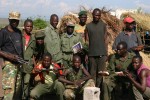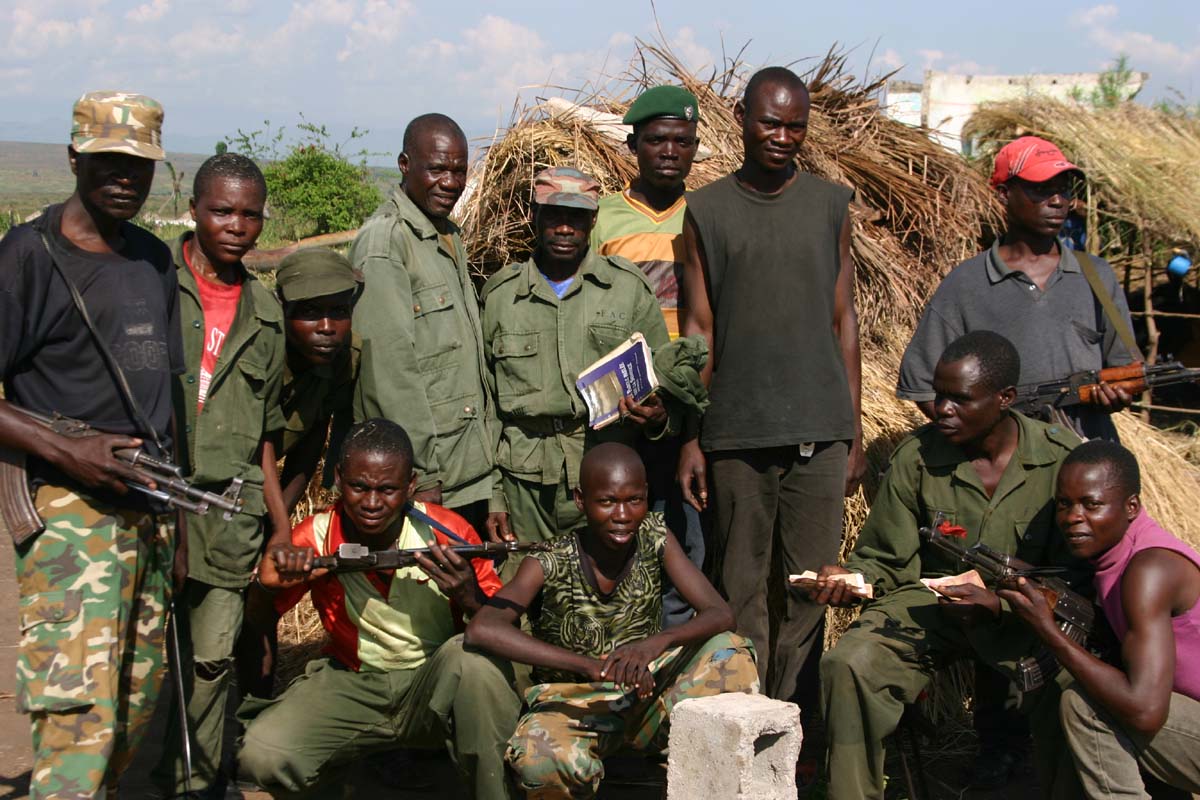
Since Rwanda and Uganda invaded the Congo in 1996, these countries
have pursued a plan to appropriate the wealth of Eastern Congo either
directly or through proxy forces.
The December 2008 United Nations report is the latest in a series of
U.N. reports dating from 2001 that clearly documents the systematic
looting and appropriation of Congolese resources by Rwanda and Uganda,
two of Washington and London’s staunchest allies in Africa.
However, in the wake of the December 2008 report, which clearly documents Rwanda’s support of destabilizing proxy forces inside the Congo, a series of stunning proposals and actions have been presented which all appear to be an attempt to cover up or bury the damning U.N. report on the latest expression of Rwanda’s aggression against the Congolese people.
The earliest proposal came from Herman Cohen, former assistant secretary of state for African affairs under George H. W. Bush. He proposed that Rwanda be rewarded for its well documented looting of Congo’s wealth by being a part of a Central and East African free trade zone whereby Rwanda would keep its ill-gotten gains.
French President Nicholas Sarkozy would not be outdone; he also brought his proposal off the shelf, which argues for essentially the same scheme of rewarding Rwanda for its 12-year war booty from the Congo. Two elements are at the core of both proposals.
One is the legitimization of the economic annexation of the Congo by Rwanda, which for all intents and purposes represents the status quo. Second—basically the laying of the foundation for the balkanization of the Congo or the outright political annexation of Eastern Congo by Rwanda. Both Sarkozy and Cohen have moved with lightning speed past the Dec. 12, 2008, United Nations report to make proposals that avoid the core issues revealed in the report.
The U.N. report reaffirms what Congolese intellectuals, scholars and victims have been saying for over a decade in regard to Rwanda’s role as the main catalyst for the biblical scale death and misery in the Congo. The Ugandan and Rwandan invasions of 1996 and 1998 have triggered the deaths of nearly 6 million Congolese. The United Nations says it is the deadliest conflict in the world since World War II.
The report “found evidence that the Rwandan authorities have been complicit in the recruitment of soldiers, including children, have facilitated the supply of military equipment, and have sent officers and units from the Rwandan Defense Forces” to the DRC. The support is for the National Congress for the Defense of the People, or CNDP, formerly led by a self-proclaimed general, Laurent Nkunda.
The report also shows that the CNDP is sheltering a war criminal wanted by the International Criminal Court (ICC), Gen. Jean Bosco Ntaganda, who was Nkunda’s chief of staff. The CNDP has used Rwanda as a rear base for fundraising meetings and bank accounts, and Uganda is once more implicated as Nkunda has met regularly with embassies in both Kigali and Kampala.
Also, Uganda is accepting illegal CNDP immigration papers. Earlier U.N. reports said that Kagame and Museveni are the mafia dons of Congo’s exploitation. This has not changed in any substantive way.
The report implicates Tribert Rujugiro Ayabatwa, a close advisor to Paul Kagame, president of Rwanda. Rujugiro is the founder of the Rwandan Investment Group. This is not the first time he has been named by the United Nations as one of the individuals contributing to the conflict in the Congo.
In April 2001, he was identified as Tibere Rujigiro in the U.N. Panel of Experts on the Illegal Exploitation of Natural Resources and Other Forms of Wealth in the Democratic Republic of the Congo as one of the figures illegally exploiting Congo’s wealth. His implication this time comes in financial contributions to CNDP and appropriation of land.
This brings to light the organizations he is a part of, which include but are not limited to the Rwanda Development Board, the Rwandan Investment Group, of which he is the founder, and Kagame’s Presidential Advisory Council. They have members as notable as Rev. Rick Warren, business tycoon Joe Ritchie, former British Prime Minister Tony Blair, Scott Ford of Alltell, Dr. Clet Niyikiza of GlaxoSmithKline, former U.S. president Bill Clinton and many more.
These connections provide some insight into why Rwanda has been able to commit and support remarkable atrocities in the Congo without receiving even a reprimand in spite of the fact that two European courts have charged their top leadership with war crimes and crimes against humanity. It is only recently that two European nations, Sweden and the Netherlands, have decided to withhold aid from Rwanda as a result of their aggression against the Congolese people.
The United Nations report shows that the Congolese soldiers have also given support to the FDLR and other armed groups to fight against the aggression of Rwanda’s CNDP proxy. One important distinction must be made in this regard. It appears that the FDLR support comes more from individual Congolese soldiers as opposed to overall government support.
The Congolese government is not supporting the FDLR in incursions into Rwanda; however, the Rwandan government is in fact supporting rebel groups inside Congo. The Congolese population is the victim of the CNDP, FDLR and the Congolese military.
The United Nations report is a predictable outgrowth of previous reports produced by the U.N. since 2001. It reflects the continued appropriation of the land, theft of Congo’s resources, and continuous human rights abuses caused by Rwanda and Uganda. An apparent aim of these spasms is to create facts on the ground – land appropriation, theft of cattle and other assets – to consolidate CNDP-Rwandan economic integration into Rwanda.
Herman Cohen’s “Can Africa Trade Its Way to Peace?” in the New York Times reflects the disastrous policies that favor profits over people. In his article, the former lobbyist for Mobutu Sese Seko and Kabila’s government in the United States and former assistant secretary of state for Africa from 1989 to 1993 argues, “Having controlled the Kivu provinces for 12 years, Rwanda will not relinquish access to resources that constitute a significant percentage of its gross national product.”
He adds, “The normal flow of trade from eastern Congo is to Indian Ocean ports rather than the Atlantic Ocean, which is more than a thousand miles away.” Continuing his argument, he believes that “the free movement of people would empty the refugee camps and would allow the densely populated countries of Rwanda and Burundi to supply needed labor to Congo and Tanzania.”
Cohen’s first mistake in providing solutions to the conflict is to look at the conflict as a humanitarian crisis that can be solved by economic means. Uganda and Rwanda are the aggressors. Aggressors should not define for the Congo what is best, but rather it is for the Congo to define what it has to offer to its neighbor.
A lasting solution is to stop the silent annexation of Eastern Congo. The International Court of Justice (ICJ) has already weighed in on this matter when it ruled in 2005 that Congo is entitled to $10 billion in reparations due to Uganda’s looting of Congo’s natural resources and the commission of human rights abuses in the Congo. It would have in all likelihood ruled in the same fashion against Rwanda; however, Rwanda claimed to be outside the jurisdiction of the court.
The United States and Great Britain’s implication is becoming very clear. These two great powers consider Rwanda and Uganda their staunch allies and, some would argue, client states. These two countries have received millions of dollars of military aid, which in turn they use in Congo to cause destruction and death.
Rwandan President Paul Kagame is a former student at the U.S. military training base, Fort Leavenworth, and Uganda President Yoweri Museveni’s son, Muhoozi Kainerugaba, graduated from the same U.S. military college in the summer of 2008.
The United States and Great Britain should follow the lead of the Dutch and Swedish governments who have suspended their financial support to Rwanda. U.S. and British taxpayers’ support has enabled the invasions and occupations that resulted in an estimated 6 million people dead in Congo; hundreds of thousands of women have been systematically raped as an instrument of war and millions displaced.
Pressure on Rwanda is required in spite of the Kigali government’s recent so-called “house arrest” of Laurent Nkunda. African institutions such as the Southern African Development Community (SADC) and the African Union are primed to be more engaged in the Congo issue. Considering Congo’s importance to Africa, it is remarkable that they have been so anemic in regard to the Congo crisis for so long.
Rwanda’s leader, Kagame, cannot feel as secure or be as arrogant as he has been in the past. One of his top aides was arrested in Germany as a result of warrants issued by a French court in connection with the assassination of President Juvenal Habyarimana –which sparked the 1994 horrors—and there is almost global consensus that pressure must be put on Kagame to cease his support for the forces destabilizing Congo and the resultant humanitarian catastrophe.
In addition to pressure on Kagame, the global community should support the following policies:
(1). Initiate an international tribunal on the Congo; (2). Work with the Congolese to implement a national reconciliation process; this could be a part of the international tribunal; (3). Work with the Congolese to assure that those who have committed war crimes or crimes against humanity are brought to justice; (4). Hold accountable corporations that are benefiting from the suffering and deaths in the Congo; and, (5). Make the resolution of the Congo crisis a top international priority.
The right to life is not a privilege, and Congolese deaths must be honored by due process of the law. As the implication of the many parties in this conflict becomes clear, we should start firmly acknowledging that the conflict is a resource war waged through U.S. and British allies.
Congolese deserve people of goodwill to advocate for the measures I have outlined to end the conflict and start the new path to peace, harmony and an end to the exploitation of Congo’s wealth and the devastation of its peoples.
About Kambale Musavuli
- Web |
- More Posts(1)




